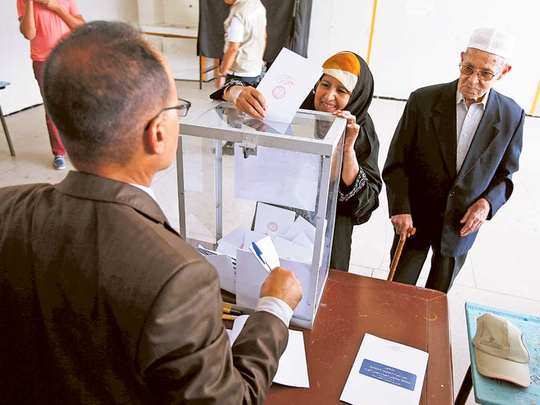
Rabat: Millions of Moroccans headed out to vote Friday, with worries about joblessness and extremism on their minds as they chose which party will lead their next government.
Adultery scandals and thwarted election-day attacks marked the unusually venomous campaign in this North African nation, which is seen as a model of stability and relative prosperity in the region.
Top contenders are a moderate Islamist party and an up-and-coming rival party seen as close to the royal palace. The palace pledged to loosen control over Moroccan politics after Arab Spring protests five years ago, but still retains control over major policy decisions.
“We are just hoping for the best” after the harsh campaign, said Fatima Ibn Abou, among dozens voting at the Mouad Ibn Jabal middle school in Casablanca where the prime minister is casting his ballot.
Since the last legislative elections in 2011, the Islamist Party of Justice and Development (PJD) has dominated parliament and led a government coalition comprised of several parties with differing ideologies, but it has also been hit with scandals.
The PJD faces tough competition from the Party of Authenticity and Modernity (PAM), widely regarded as close to the palace. It was founded in 2008 by Fouad Ali El Himma, childhood friend of King Mohammad VI and a current royal adviser.
The PAM, which wants to legalise cannabis, aims to bring more women into parliament, where they hold just 67 out of 395 seats.
Several parties have fielded ultra-conservative Salafists in a sign that Islamists are becoming a feature of Moroccan politics.
A list system and an electoral threshold that has been halved from six to three per cent could hand small parties a key role in forming the next government.
The PJD and the PAM have ruled out joining forces in a grand coalition.
Under the 2011 constitution, the king appoints a prime minister from the biggest party in parliament once the election results have been announced.
To help illiterate voters, each party is represented by a symbol on the ballot as well as its name — a lamp for the PJD, a tractor for the PAM, and other symbols for the other 26 parties.
Friday’s election will determine the make-up of the upper chamber of parliament, comprised of 395 seats, 90 of which are reserved for women and youth. Nearly 7,000 candidates are running in 92 voting districts. Definitive results are expected Saturday.
Abdelilah Benkirane, the prime minister and head of the PJD, has clashed in recent public spats with Ilyas Al Omari, head of the PAM. This week, Benkirane slammed Al Omari for comments he made to the press suggesting that state-funded associations were among groups involved in radicalising Moroccan youth.
With high unemployment and relatively low literacy, Morocco has been fertile recruiting ground for extremists. As many as 1,000 Moroccans have joined the ranks of the Daesh terror group in Iraq and Syria.
On Monday, authorities dismantled a 10-member terror cell comprised entirely of women with alleged ties to Daesh.
Abdul Haq Khiame, head of Morocco’s Central Bureau of Judicial Investigations, said the cell planned to carry out attacks on election day, Friday, according to Morocco’s state news agency MAP. Seven of the 10 members were underage, he said.
In addition to security, Morocco’s economic ills are a top concern, including youth joblessness and record high foreign debt. Many voters are frustrated with the status quo, especially in rural areas.
Emad Agrili, 31, a painter from the rural town of Skoura, was voting for the first time and opted for the Federation of the Democratic Left. “They seem clean and transparent,” he said.
For others, like the banned Islamist Adl wal Ihsan (Justice and Charity) movement, the election in Morocco is futile. The movement, which is boycotting the election, denounces the centralisation of power and the decision-making by the monarchy.
“The person who governs is the king and his entourage and they have deeply-rooted powers,” says Hassan Bennajeh, spokesman for Adl wal Ihsan.
More than 15.7 million Moroccans have registered to vote but last time voter turnout was only around 5 million, says Abdul Wahab Kayyali, doctoral candidate in political science at George Washington University.
“These elections, specifically, matter a lot ... and will show whether 2011 was just a blip on the radar screen” in gauging Morocco’s path toward reform, he said.
The 2011 Arab Spring uprisings have left a mixed legacy in North Africa — Tunisia built a fragile democracy, Egypt elected Islamists who were then ousted by the military and Libya has descended into deadly chaos.












